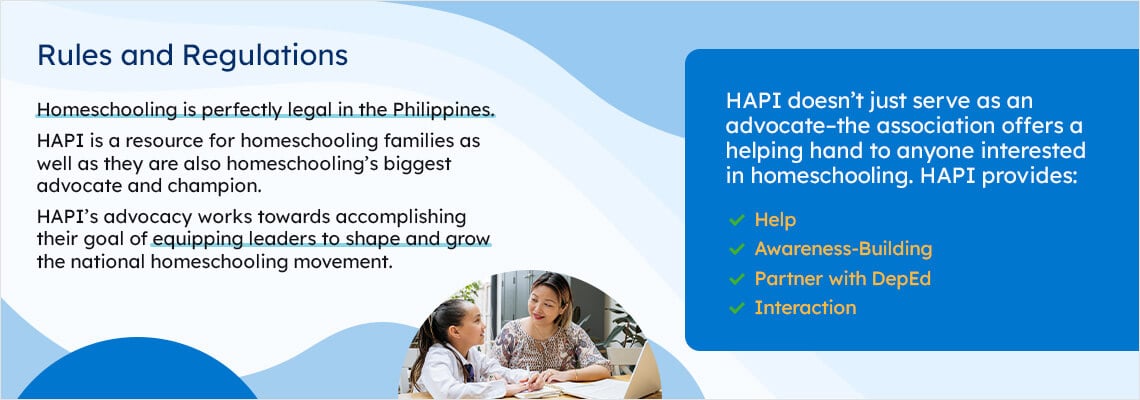Just like any other type of schooling, homeschooling is an international endeavor. Millions of families around the world have made the decision to take their child’s education into their own hands, especially during and in the wake of COVID-19. And, like the United States, every country has its own opinions, philosophies, and laws surrounding homeschooling.
In this monthly series, we’ll take a look at different countries around the world and how they view homeschooling as well as the types of laws (if any) those countries have to govern homeschooling. The first country we visited was the second-largest country in the world, northern neighbor to the United States–Canada. This time we’ll scale things down a bit and take a journey to the Southeast Asian island country of the Philippines!
Whereas Canada is a massive area of land, the Philippines is an archipelago consisting of approximately 7,100 islands and islets, about 500 miles west of Vietnam, in the western Pacific Ocean. The largest island of Luzon is home to both of the country’s most populous cities–Manila (the capital) and Quezon City–in an area known as the National Capital Region.
In 2019, the Philippines’ population was approximately 108.1 million, an impressive number considering the overall size of the country. To put that figure into perspective, the Filipino population is more than the United Kingdom and Canada combined! So, out of those 108.1 million people, how many homeschooled children are there? Just 12,000 according to the HSLDA (Homeschool Legal Defense Association).
Now, these numbers were prior to COVID-19, so that figure was much higher in 2020. But, overall, homeschooling hasn’t been a widely used form of education in the Philippines. For quite a long time, many Filipinos considered homeschooling to be an education option reserved only for the rich–which actually has traditionally been the case in the Philippines. Traditional schooling remains the preferred method of education in the country.
Rules and Regulations for Homeschooling in the Philippines
Though it may not be widespread just yet, homeschooling is perfectly legal in the Philippines. While the size of the homeschooling population in the Philippines is modest, you certainly can’t question the passion of those who choose to homeschool on the island nation. For example, the Homeschool Association of the Philippine Islands (HAPI) is not only an incredible resource for homeschooling families, but they are also homeschooling’s biggest advocate and champion. The organization made major strides toward widespread homeschool recognition through the creation of Philippine National Homeschool Day, which occurs every March 3rd. HAPI’s advocacy, with the aid of Senator Francis N. Pangilinan, who authored the senate resolution, made this day a reality, accomplishing their goal of equipping leaders to shape and grow the national homeschooling movement.
But HAPI doesn’t just serve as an advocate–the association offers a helping hand to anyone interested in homeschooling. Through a clever acronym that matches the organization’s name, HAPI provides:
- Help through leadership building, discounts to school-related establishments and facilities, and assistance in starting a homeschool group.
- Awareness-Building through listings on the HAPI website and social media, as well as inclusion and benefits in the annual Philippine Home Education Conference and National Homeschoolers Day celebration.
- Partner with DepEd as a liaison and conduit with the Department of Education, and with help creating and maintaining a homeschool framework.
- Interaction through opportunities to discuss best practices with other HAPI members as well as participation and use of national research collected by HAPI.
These groups and websites can also help provide support, answer your questions, and assist you along the way.
- HSLDA Philippines
- Homeschool Association of the Philippine Islands
- Homeschool Resources Philippines Facebook
- TeacherPH
There are a couple of different ways to homeschool: through the Department of Education (DepEd) Home Study Program and through independent homeschooling. Let’s take a look at each.
Home Study Programs: According to the HSLDA, Home Study Programs “are implemented by interested divisions of the DepEd in consonance with the 1987 Constitution (Article XV) which provides that quality education at all levels be made accessible to all Filipinos, and that non-formal and indigenous learning systems, as well as self-learning and out-of-school study programs, particularly those that respond to community needs be developed.”
Quezon City and Rizal in the National Capital Region offer Home Study Programs, with the objectives of the program (in Quezon City) to “provide an affordable secondary education for all, and bring about an opportunity to enhance the quality of life of the citizenry; give opportunity for sickly and working students to finish their secondary schooling; and help solve the school problem of shortage of teachers and classrooms.”
Clearly these homeschooling programs accomplish a few very divergent goals that are different from those in the United States and other countries. For one, the Filipino Department of Education takes into account children who have to work at a young age to help support their families. The program in Quezon City allows the students who work in factories, as babysitters, vendors, janitors, and laborers an opportunity to both work and complete their secondary education. Additionally, homeschooling helps alleviate school crowding in the Philippines, something that’s not a prominent issue in North America.
To be admitted into a Home Study Program, students must achieve a minimum 80% average rating in English, math, science, and Filipino at the elementary level. If a student is employed, a certificate of employment must be presented, as must a medical certificate for ill students.
As for the actual schooling, students are given the same textbook in all subjects for the school year and are provided with weekly study topics. The students must answer certain questions presented by teachers at the conclusion of each topic; these “contact sessions” between students and teachers occur on Saturdays and can be used for clarification of difficult topics students encounter during the week.
Teachers possess full authority on instruction, guidance, and supervision within the program, though educated parents are allowed to help prepare homework. However, given that many Filipino parents are busy working, the education falls primarily on the teachers.
Independent Homeschooling: This approach to homeschooling is…pretty much exactly as it sounds. Independent homeschooling is essentially homeschooling on your own, without enrolling with a DepEd-accredited homeschool provider. However, the Filipino government has recently shifted its view regarding independent homeschooling and is strongly considering their rights to oversee these programs.
The requirements to homeschool in the Philippines are not overly stringent (though this may change–it’s best to check with the local government before committing to homeschooling). The Constitution states: “All educational institutions…shall inculcate patriotism and nationalism, foster love of humanity, respect for human rights…teach the rights and duties of citizenship, strengthen ethical and spiritual values, develop moral character and personal discipline, encourage critical and creative thinking, broaden scientific and technological knowledge, and promote vocational efficiency.”
All of that is a formal way of saying, “if you teach your children to be good, responsible, ethical, hard-working, creative, patriotic citizens, teach anything you want to teach them.” To this point, there doesn’t seem to be much in the way of required check-ins, progress reports, or surprise visits…though it’s never a bad idea to keep a detailed portfolio of work and projects just in case anyone happens to ask about your child’s progress. That said, the DepEd does have some set expectations of what children should be learning at a particular age.
Independent homeschooling in the Philippines is, at its core, the same as it is anywhere else. You’re free to choose your own courses, homeschool curriculum, resources, and materials. You can also opt for a US-based homeschool program. Like, say…Bridgeway Academy!
Parents who opt to homeschool their children through a DepEd-accredited homeschool provider must be college graduates. Those parent-teachers who do not have a college degree are still permitted to teach their children independently and have their students re-enter the Department of Education system through the Philippine Educational Placement Test (PEPT). For students who would like to transfer into a traditional school, (s)he must first be accredited by the DepEd before enrolling.
Bridgeway in the Philippines
With the rise of bullying and social pressure in school, parents are eager to understand the benefits of homeschooling. We can help.
Bridgeway Academy is the homeschool choice for many students in the Philippines! And just like we did for those students, Bridgeway can help your family choose the right program to fit your schedule and needs. We offer pre-k and kindergarten homeschool programs, elementary homeschool programs, middle school homeschool programs, and high school homeschool programs.
We’re also aware of the country’s requirements, so our team is ready to get you set up with the perfect homeschool program. You can download our free PDF about homeschooling with a U.S. based program and then contact our admissions team today at (800) 863-1474 to start your homeschool adventure.










